Summary
- Trish Cotter and Sandra Mullin of Vital Strategies urge the International Olympic Committee (IOC) to end its partnership with Coca-Cola for the benefit of athletes, spectators, and the environment.
- The authors argue that Coca-Cola’s sponsorship links athletes to unhealthy sugary drinks, allows the company to influence political and corporate leaders, and contravenes the IOC’s mission to prioritize athlete health.
- Despite knowing the health risks of sugary drinks, Coca-Cola remains a key sponsor of the Olympics, leveraging the global viewership and using sports marketing to promote its products.
- The authors highlight that the association with Coca-Cola undermines the values of the Olympics and perpetuates global health and environmental crises.
- They call on the IOC to sever ties with Coca-Cola to uphold integrity, health, and sustainability, sending a powerful message to prioritize the well-being of athletes, spectators, and the planet.
Trish Cotter and Sandra Mullin of the organization Vital Strategies believe that the IOC should end its partnership with Coca-Cola due to the negative impact on athletes, spectators, and the environment. They argue that Coca-Cola’s sponsorship forces athletes to promote unhealthy sugary drinks and provides the company with undue influence over political and corporate leaders. Despite the health risks associated with sugary drinks, Coca-Cola remains a top-tier sponsor of the Olympic Games until at least 2032, benefiting from the massive viewership and advertising opportunities. The authors highlight the environmental impact of Coca-Cola’s packaging and distribution processes on plastic pollution, greenhouse gas emissions, and water insecurity.
In light of the evidence linking sugary drinks to health issues and the IOC’s mission to promote athlete’s well-being, the authors urge the IOC to sever ties with Coca-Cola to uphold integrity, health, and sustainability values. They believe that by continuing the association with Coca-Cola, the IOC risks being complicit in global nutrition and environmental crises. The authors call on major international public health bodies to advocate for reducing sugary drink consumption and raise awareness of the harmful effects of sports marketing. They conclude by urging the IOC to act promptly in the best interests of athletes, spectators, and the planet by distancing themselves from Coca-Cola.
Source link
Public Health & Prevention,Pulmonary Medicine Environmental Health, Social Responsibility


